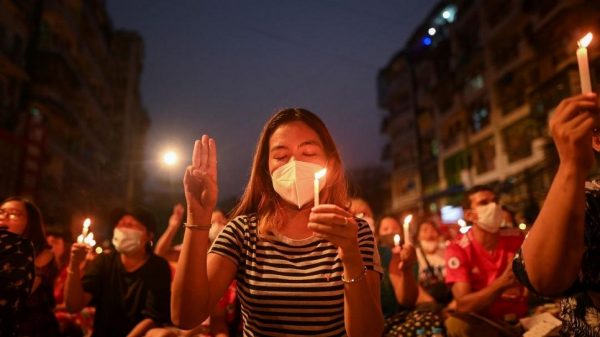Breaking Gender and Age Barriers amid Myanmar’s Spring Revolution

- Update Time : Thursday, February 16, 2023
- 56 Time View

Young people, particularly young women, have been visible and important contributors to the anti-military resistance, challenging age and gender norms in patriarchal Myanmar society.
“Politics in Myanmar is traditionally the domain of older men, but women and youth have been prominent in resistance to the 2021 military takeover,” reads a latest report of the International Crisis Group (ICS) published on Thursday (Feb 16).
Giving them a bigger voice could have a positive effect on the country’s political culture, no matter how the crisis ends, it said adding “Yet two years after the coup they remain largely excluded from formal political power, and their role in the opposition movement often goes unacknowledged.”
Their power within the movements remains limited, however, and intensified fighting in much of the country further jeopardises it.
The ICS said the National Unity Government and other anti-regime forces have strong normative reasons to address this problem. “They should do more to deepen inclusion, particularly of women and youth from diverse socio-economic and ethnic backgrounds.”
It said there was progress toward greater inclusivity during the ten years of semi-civilian rule, between 2011 and 2021, but deeply entrenched conservative attitudes and practical barriers erected during half a century of military dictatorship served to keep most women and young people out of formal politics.
In some respects, the NLD was even less inclusive than its predecessor, the military-backed Union Solidarity and Development Party, to the disappointment of activists, civil society figures and some within the party itself.
The Crisis Group report observed that the coup has helped bring to the fore a new generation, who were instrumental in launching what they call the Spring Revolution in its aftermath, organising nationwide demonstrations, strikes and boycotts.
This younger cohort, including Generation Z and millennials, came of age during the decade of semi-civilian governance and has refused to accept a return to military rule. Their views only hardened as the regime brutally cracked down on their largely peaceful protests.
From martyred demonstrators to striking garment workers and teachers leading the Civil Disobedience Movement (CDM), they have been a powerful symbol of resistance to the junta. They have used their position to challenge traditional age and gender norms and push a progressive agenda, particularly in the political sphere.
Although women are often active participants behind the scenes – for example, crafting homemade weapons or raising money – their contributions often go unrecognized, the ICG observed.
Meanwhile, the military regime has closed off what few opportunities existed for younger people, and women of all ages, to exercise political leadership.
The junta is dominated by serving and former military officers, making it highly unrepresentative of Myanmar society, and all indications are that general elections planned for late 2023 or early 2024 will bring only cosmetic change.
Despite the junta’s claims to the contrary, the vote is intended to entrench military control of nominally civilian structures, such as the national assembly. Directly or indirectly, power will still reside in the military elite, most of whom are older Burman men, possibly with token inclusion of ethnic minorities and women.
With the armed struggle gaining momentum from mid-2021, progress toward greater inclusivity has largely stalled within the resistance, ICG said adding that civil society leaders and foreign technical advisers can provide support, but senior opposition members in bodies such as the NUG will need to throw weight behind any effort to jumpstart such change.















